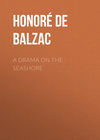Kitobni o'qish: «A Drama on the Seashore»
DEDICATION
To Madame la Princesse Caroline
Galitzin de Genthod,
nee ComtesseWalewska. Homage and
remembrances of
The Author
Nearly all young men have a compass with which they delight in measuring the future. When their will is equal to the breadth of the angle at which they open it the world is theirs. But this phenomenon of the inner life takes place only at a certain age. That age, which for all men lies between twenty-two and twenty-eight, is the period of great thoughts, of fresh conceptions, because it is the age of immense desires. After that age, short as the seed-time, comes that of execution. There are, as it were, two youths, – the youth of belief, the youth of action; these are often commingled in men whom Nature has favored and who, like Caesar, like Newton, like Bonaparte, are the greatest among great men.
I was measuring how long a time it might take a thought to develop. Compass in hand, standing on a rock some hundred fathoms above the ocean, the waves of which were breaking on the reef below, I surveyed my future, filling it with books as an engineer or builder traces on vacant ground a palace or a fort.
The sea was beautiful; I had just dressed after bathing; and I awaited Pauline, who was also bathing, in a granite cove floored with fine sand, the most coquettish bath-room that Nature ever devised for her water-fairies. The spot was at the farther end of Croisic, a dainty little peninsula in Brittany; it was far from the port, and so inaccessible that the coast-guard seldom thought it necessary to pass that way. To float in ether after floating on the wave! – ah! who would not have floated on the future as I did! Why was I thinking? Whence comes evil? – who knows! Ideas drop into our hearts or into our heads without consulting us. No courtesan was ever more capricious nor more imperious than conception is to artists; we must grasp it, like fortune, by the hair when it comes.
Astride upon my thought, like Astolphe on his hippogriff, I was galloping through worlds, suiting them to my fancy. Presently, as I looked about me to find some omen for the bold productions my wild imagination was urging me to undertake, a pretty cry, the cry of a woman issuing refreshed and joyous from a bath, rose above the murmur of the rippling fringes as their flux and reflux marked a white line along the shore. Hearing that note as it gushed from a soul, I fancied I saw among the rocks the foot of an angel, who with outspread wings cried out to me, "Thou shalt succeed!" I came down radiant, light-hearted; I bounded like a pebble rolling down a rapid slope. When she saw me, she said, —
"What is it?"
I did not answer; my eyes were moist. The night before, Pauline had understood my sorrows, as she now understood my joy, with the magical sensitiveness of a harp that obeys the variations of the atmosphere. Human life has glorious moments. Together we walked in silence along the beach. The sky was cloudless, the sea without a ripple; others might have thought them merely two blue surfaces, the one above the other, but we – we who heard without the need of words, we who could evoke between these two infinitudes the illusions that nourish youth, – we pressed each other's hands at every change in the sheet of water or the sheets of air, for we took those slight phenomena as the visible translation of our double thought. Who has never tasted in wedded love that moment of illimitable joy when the soul seems freed from the trammels of flesh, and finds itself restored, as it were, to the world whence it came? Are there not hours when feelings clasp each other and fly upward, like children taking hands and running, they scarce know why? It was thus we went along.
At the moment when the village roofs began to show like a faint gray line on the horizon, we met a fisherman, a poor man returning to Croisic. His feet were bare; his linen trousers ragged round the bottom; his shirt of common sailcloth, and his jacket tatters. This abject poverty pained us; it was like a discord amid our harmonies. We looked at each other, grieving mutually that we had not at that moment the power to dip into the treasury of Aboul Casem. But we saw a splendid lobster and a crab fastened to a string which the fisherman was dangling in his right hand, while with the left he held his tackle and his net.
We accosted him with the intention of buying his haul, – an idea which came to us both, and was expressed in a smile, to which I responded by a slight pressure of the arm I held and drew toward my heart. It was one of those nothings of which memory makes poems when we sit by the fire and recall the hour when that nothing moved us, and the place where it did so, – a mirage the effects of which have never been noted down, though it appears on the objects that surround us in moments when life sits lightly and our hearts are full. The loveliest scenery is that we make ourselves. What man with any poesy in him does not remember some mere mass of rock, which holds, it may be, a greater place in his memory than the celebrated landscapes of other lands, sought at great cost. Beside that rock, tumultuous thoughts! There a whole life evolved; there all fears dispersed; there the rays of hope descended to the soul! At this moment, the sun, sympathizing with these thoughts of love and of the future, had cast an ardent glow upon the savage flanks of the rock; a few wild mountain flowers were visible; the stillness and the silence magnified that rugged pile, – really sombre, though tinted by the dreamer, and beautiful beneath its scanty vegetation, the warm chamomile, the Venus' tresses with their velvet leaves. Oh, lingering festival; oh, glorious decorations; oh, happy exaltation of human forces! Once already the lake of Brienne had spoken to me thus. The rock of Croisic may be perhaps the last of these my joys. If so, what will become of Pauline?
"Have you had a good catch to-day, my man?" I said to the fisherman.
"Yes, monsieur," he replied, stopping and turning toward us the swarthy face of those who spend whole days exposed to the reflection of the sun upon the water.
That face was an emblem of long resignation, of the patience of a fisherman and his quiet ways. The man had a voice without harshness, kind lips, evidently no ambition, and something frail and puny about him. Any other sort of countenance would, at that moment, have jarred upon us.
"Where shall you sell your fish?"
"In the town."
"How much will they pay you for that lobster?"
"Fifteen sous."
"And the crab?"
"Twenty sous."
"Why so much difference between a lobster and a crab?"
"Monsieur, the crab is much more delicate eating. Besides, it's as malicious as a monkey, and it seldom lets you catch it."
"Will you let us buy the two for a hundred sous?" asked Pauline.
The man seemed petrified.
"You shall not have it!" I said to her, laughing. "I'll pay ten francs; we should count the emotions in."
"Very well," she said, "then I'll pay ten francs, two sous."
"Ten francs, ten sous."
"Twelve francs."
"Fifteen francs."
"Fifteen francs, fifty centimes," she said.
"One hundred francs."
"One hundred and fifty francs."
I yielded. We were not rich enough at that moment to bid higher. Our poor fisherman did not know whether to be angry at a hoax, or to go mad with joy; we drew him from his quandary by giving him the name of our landlady and telling him to take the lobster and the crab to her house.










